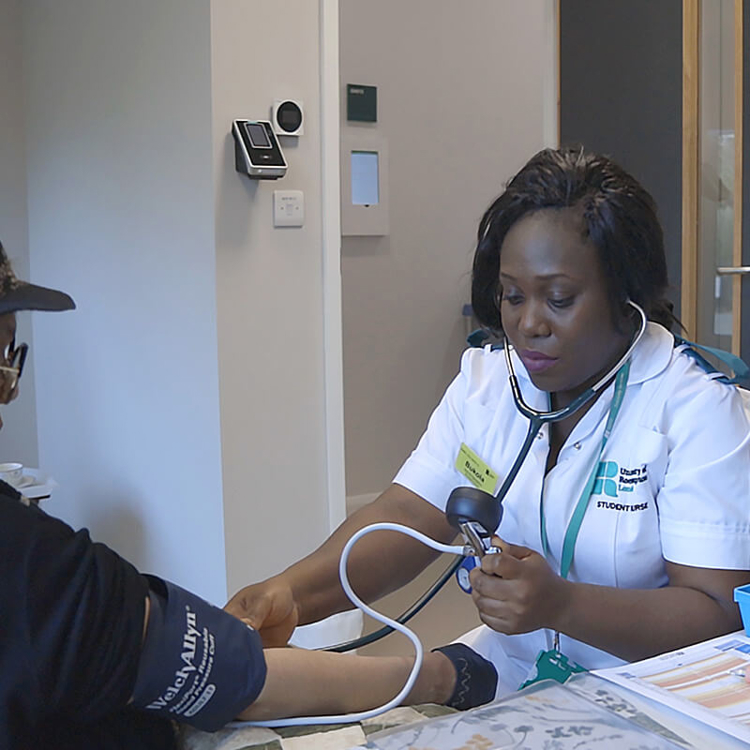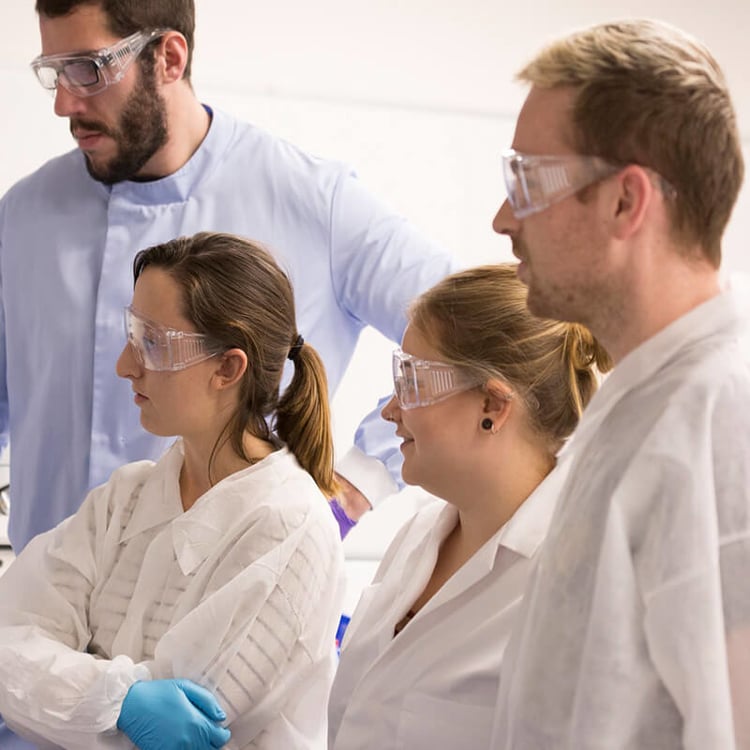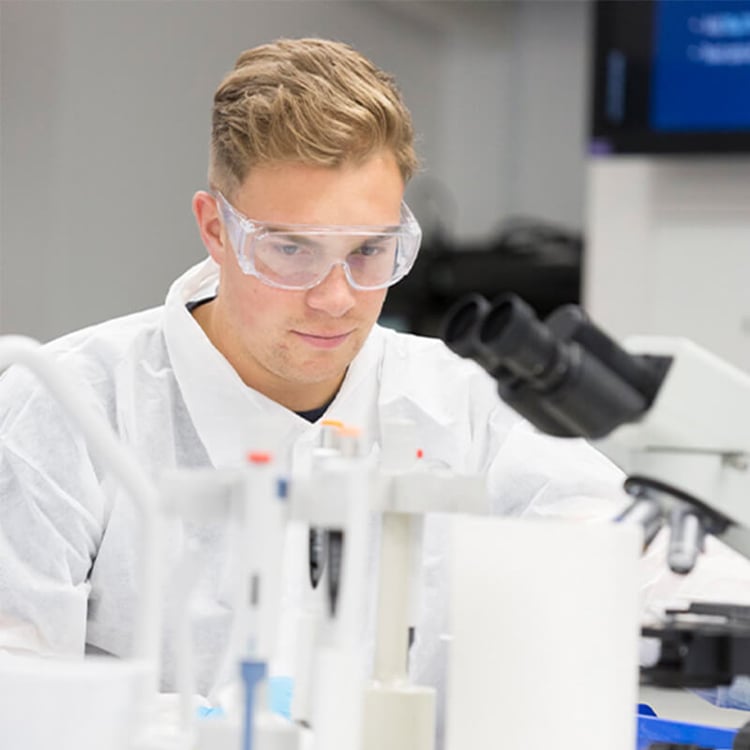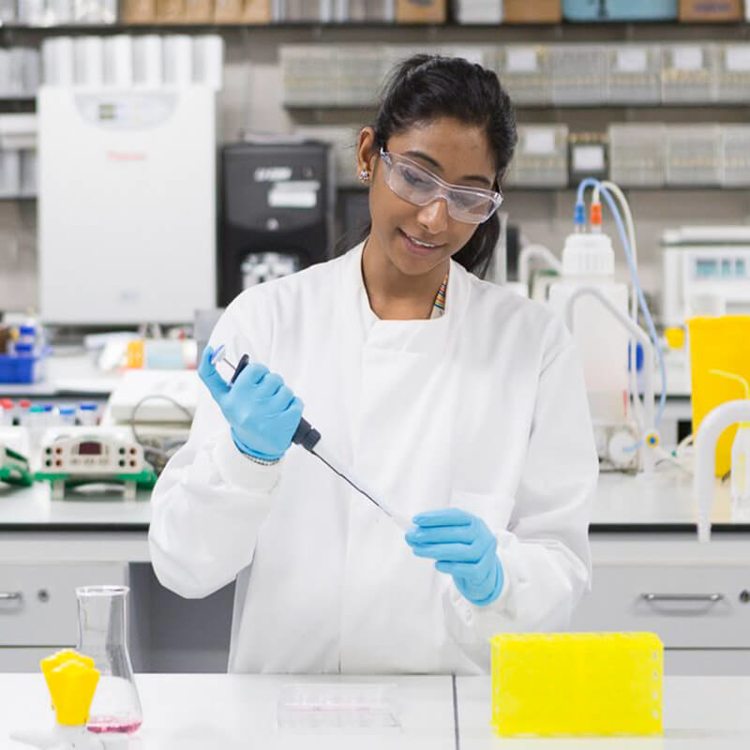Entry tariff:
UCAS code:
B930
Start date(s):
September 2025
September 2026
Study to become an Occupational Therapist, a health professional whose aim is to help all people with different abilities to live meaningful lives. The goal of occupational therapy is to promote the capacity of individuals, groups, communities and organisations to engage in their valued and necessary occupations.
Did you know
This programme blends theory and real-world practice, with over 1000 clinical placement hours across 3 years. Students gain hands-on experience through practice placements.
This programme is pending accreditation by the Health and Care Professions Council (HCPC) and The Royal College of Occupational Therapists (RCOT), enabling graduates to apply for registration on successful completion, and gain a qualification recognised by the World Federation of Occupational Therapists.
Module details: In this module, you will explore key concepts and foundations of human physiology and anatomy. You will gain an understanding of the structure and function of the human body by studying anatomical features and the physiology of body systems. The module will also examine how these systems interact to maintain homeostasis and support health across the lifespan. Designed to support interprofessional learning, it provides essential knowledge for those entering health and social care professions.
Module details: In this module, you will be introduced to the key concepts and core foundations of occupational therapy theory and practice. You will explore what it means to be an occupational being and examine the evidence that informs professional practice. Through case-based learning, you will engage with the human experience of occupation and consider theoretical perspectives from occupational science, health psychology and sociology to support your understanding of the profession.
Module details: In this module, you will learn from, about, and with peers from other professional programmes, supporting interprofessional collaboration. You will develop essential academic and study skills while exploring what it means to be a professional. The module will examine key ethical, legal, and regulatory frameworks relevant to each student’s chosen discipline. Through shared learning and reflection, you will begin to build a strong professional identity within the wider context of health and social care practice.
Module details: In this module, you will explore the key concepts of occupational therapy across the lifespan, from birth to end of life. You will develop an understanding of how humans and their occupations change over time and examine the evidence that informs professional practice. The module will support your learning of occupational therapy within various life stages, including infancy, childhood, adolescence, adulthood, older adulthood, and end-of-life care.
Module details: In this module, you will be introduced to practice learning, which will be developed further through clinical placements across the programme. You will begin building the professional values, knowledge and skills required to provide safe, effective, compassionate, and evidence-based person-centred care. The module focuses on preparing you to work within a range of practice settings and supports your understanding of the occupational therapist’s role in diverse health and social care environments.
Students are required to pass all assessments and all module components on the programme in order to be eligible for registration with the Health and Care Professions Council and the Royal College of Occupational Therapists.
These are the current planned modules on this course and may be subject to change.
Module details: In this module, you will deepen your understanding of occupational therapy by exploring more complex areas of practice and current approaches in diverse health and social care settings. You will build on your knowledge of the profession’s philosophies and interventions, using a case-based approach to evaluate the human experience of occupation. The module encourages critical thinking through engagement with theoretical concepts from occupational science in a variety of complex and evolving practice contexts.
Module details to be confirmed.
You will build an understanding of research skills with a strong emphasis on evidence-based practice to support transformation in health and social care. Through interprofessional learning, you will explore the value of collaboration in healthcare research. The module also introduces digital healthcare innovations and examines the role of artificial intelligence in supporting research. This foundation will equip you to critically engage with research and apply evidence to improve practice across diverse care settings.
Module details: In this module, you will enhance your knowledge and critical thinking in exploring global occupational therapy. You will examine practices across the Global South and North and engage with occupational therapy students from Roehampton’s international partner institutions. These include universities in Hong Kong, Kenya, Moldova, South Africa, Australia, Thailand, Canada, Singapore, and Brazil, offering you a broader perspective on global health, cultural contexts, and international approaches to occupational therapy practice.
Module details: In this module, you will build on your previous practice learning and undertake two clinical placements in your second year: an eight-week placement and a four-week placement. These full-time placements will enhance your ability to apply theory to practice. You will also participate in weekly Action Learning Sets, where you will collaborate with peers, reflect on experiences, and deepen your understanding of occupational therapy in real-world settings.
Students are required to pass all assessments and all module components on the programme in order to be eligible for registration with the Health and Care Professions Council and the Royal College of Occupational Therapists.
These are the current planned modules on this course and may be subject to change.
Module details: In this module, you will enhance your knowledge and critical skills by exploring diverse and emerging areas of occupational therapy practice. You will analyse the profession’s philosophies and innovative approaches across a range of health and social care contexts. Through case scenarios, workshops, and project work, you will learn to critique and develop person-centred interventions that support individuals in achieving their occupational goals.
Module details: In this module, you will focus on preparation for employment as a qualified allied healthcare professional, with an emphasis on life-long learning and continuing professional development. You will develop self-awareness and explore key concepts such as self-care, stress management, compassion, and resilience. The module aims to equip you with the skills to maintain workforce sustainability and promote personal wellbeing in the workplace, ensuring you are prepared for the demands and challenges of a career in healthcare.
Module details: In this module, you will enhance your understanding across all pillars of practice, with a particular focus on leadership in healthcare. You will develop key leadership skills and explore approaches to innovative practice. The module also examines educational principles to support teaching, learning, and assessment in practice-based settings. You will learn how to effectively educate and support colleagues, students, and service users, preparing you to take on leadership and educational roles within health and social care environments.
In this module, you will have the opportunity to develop a detailed understanding of a specialist research topic. You will undertake a research project using rigorous scientific methods of investigation and analysis. This project allows you to demonstrate your advanced practical and investigative skills, along with your written and oral presentation abilities. Through this process, you will refine your research skills and showcase your capability to conduct independent, high-quality research in your chosen field.
Students are required to pass all assessments and all module components on the programme in order to be eligible for registration with the Health and Care Professions Council and the Royal College of Occupational Therapists.
September 2025 entry onwards: We are reviewing and updating our curriculum to ensure our programmes provide the skills, knowledge, and experience needed for the evolving job market.
The modules listed are a sample of those currently offered and may change through the review process. However, the core learning outcomes and themes will remain similar.
These are the current planned modules on this course and may be subject to change.

Skills
Interested in making a difference to individuals, groups and communities?
This programme is aimed at students wanting to become Occupational Therapists, giving you the skills to provide exceptional care to a wide range of individuals, including:
- Those living with physical and mental health conditions
- People with learning disabilities
- Across the lifespan
Occupation refers to the meaningful activities and roles within the environments in which people live and function. It is not just about the work someone does, but any activity that an individual might do for leisure, self-care and even play.
Occupational therapists use a person-centred approach and evidence-based practice to work with people of all ages, from infancy through midlife to old age, to navigate physical, emotional or social barriers and address inequities in participation in their chosen ‘occupations’.
With a strong ethos in interprofessional learning and collaboration, this programme will be co-delivered alongside the BSc Physiotherapy programme, enabling students to develop core skills in working within a multiprofessional environment and with colleagues from across disciplines. This will set students up for success in all future placement and professional work experiences, where interprofessional working is at the core of all health and social care service delivery.
The University of Roehampton has a strong history of delivering high quality health and social care programmes, including MSc (pre-registration) pathways for both Occupational Therapy and Physiotherapy, as well as programmes such as dietetics and nutrition, nursing, sports & exercise science, and other creative therapies including art, drama, music and play therapy. We are excited to be adding the BSc provision of Occupational Therapy to this growing number of health degrees.
This course will give you the knowledge and skills to carve out a successful career in the health and social care sector.
You’ll gain a strong foundation by intergrating theory with practice. You’ll learn to assess not only the physical and psycho-emotional aspects of the individuals that you work with but also their environment, from early intervention to ongoing community rehabilitation.
You’ll be encouraged to think creatively and develop personalized solutions.
Learning
Experience a dynamic, contemporary curriculum in state-of-the-art facilities.
You will undertake activities to develop your ability to critically appraise and apply theory through case-based learning, simulation and on practice placements.
You will use simulation to prepare for the realities of practice placement experiences.
Simulation will provide you with the opportunity to explore occupational therapy practice skills in an authentic, safe and supportive environment. This will help to improve your confidence, develop preparation for practice and enhance patient safety.
The programme focuses on getting you ready to work in health and social care organisations, housing, education and voluntary organisations. Throughout the course you will gain practical skills and experience by learning how to:
- Develop skills, knowledge and understanding necessary for competent occupational therapy practice
- Assess and critically analyse the professional and scientific knowledge base which informs occupational therapy practice
- Practice using knowledge and skills specific to occupational therapists, so as to optimise the health and social well-being of the people you work with.
This programme also focuses on community and social care, in line with the NHS Long Term Plan and associated workforce strategy.
Roehampton has longstanding significant expertise in the broad field of health and wellbeing which are all relevant to the development and delivery of the pre-registration Occupational Therapy curriculum.
Practice-based learning is central to the educational process, which includes curriculum content and is an educational method but is acknowledged separately because specific standards and criteria apply. Practice-based learning is appropriately integrated throughout the curriculum, with one external and one simulated placement in year 1 and two external placements in year 2, and a final placement in year 3.
Practice-based learning helps enable the learner’s formation of their identity as an occupational therapist. The overall learning outcome for practice education within the BSc Occupational Therapy (pre-reg) programme is aligned with the professional standards for practice and the ethical and professional conduct expectations of the profession.
The Royal College of Occupational Therapists (RCOT) require placements to be an integral part of a pre-registration programme, facilitating ‘the learners’ formation of their identity as an occupational therapist and develops learners to meet the professional standards for practice and the ethical and professional conduct expectations of the profession’ (Learning and Development Standards for preregistration Education 2023).
Successful completion (ie, passing grade) of a minimum of 1000 practice placement hours is required in order to become a registered Occupational Therapist with the HCPC, RCOT and for recognition by the World Federation of Occupational Therapists.
Over the course of the three years of the programme, the practice placement structure will consist of:
- Year 1: One part-time simulated placement; and one external full-time placement.
- Year 2: One part-time simulated placement, 1 full time external placement.
- Year 3: Two, full time external placement.
- Pre-registration placements are assessed on a pass/fail basis at levels 4 (PP1), 5 (PP2) and 6 (PP3 and PP4).
You may be eligible for an NHS Learning Support fund (LSF) of £5,000 each academic year of study. More information can be found here.

Assessment
Push yourself further with real- world assignments
Throughout your course, you’ll experience a wide range of assessments that enhance your understanding and practical skills, while giving you a taste of industry practices. These include:
- creating an academic poster
- vlogs and podcasts
- practical assessments
- case-study based assessments
- oral presentations
- self-reflections
- peer assessment
You’ll leave Roehampton with an in-depth understanding of both the theory and hand-on applications of occupational therapy, ready to take the next step into your professional life.
Careers
Help shape the future of public health.
If you're ready to learn, we'll help you gain confidence and opportunities to achieve.
Our graduates go on to work in different sectors including:
- National Health Service
- Community Services
- Local Authorities
- Social services and Care Settings
- Private Practice
- Primary Care
- Education Settings/Schools
- The Prison Services
- Research and Leadership
- Working Overseas
- Charity and 3rd Sector Organisations.
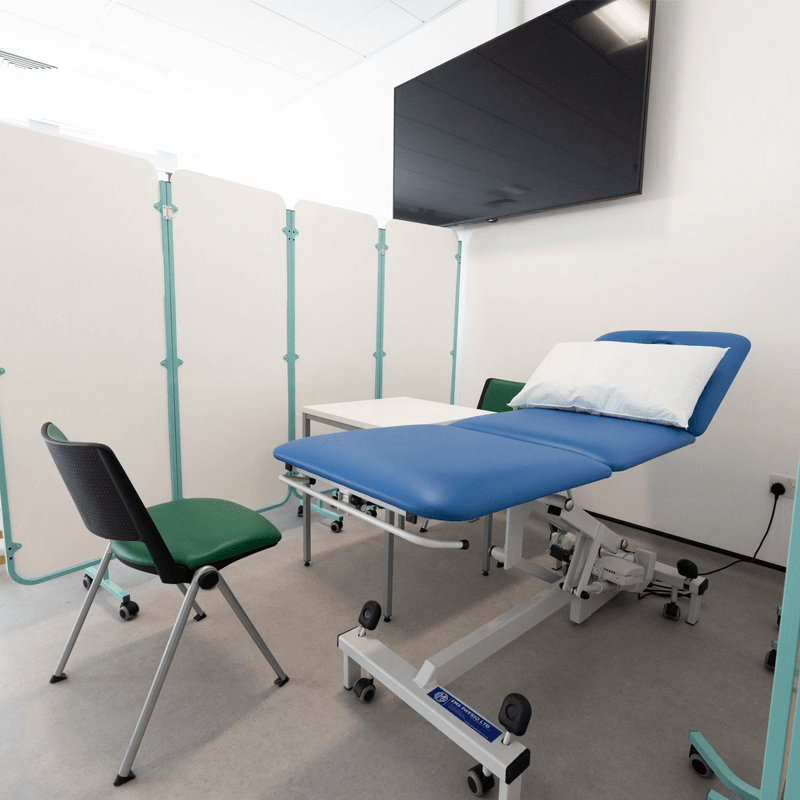
Our Careers team is on hand to help from the start of your studies until after you graduate. Under their guidance you’ll benefit from a wide range of support, including:
-
CV building
-
Interview preparation
-
Mentoring
-
Industry connections
-
Work experience
-
Volunteering opportunities
-
Job fairs
-
Introductions to future employers.
Open days
Get a real taste of our campus, community and what it’s like to study at Roehampton
Applying
Full-time UK undergraduate students apply through UCAS.
Course subject to curriculum review and validation.
Specific entry requirements:
Normally five GCSEs at grade C or above, including mathematics, English language or literature and a science subject or equivalent. A Levels BBB (*BCC for adjusted criteria backgrounds), BTEC or equivalent. All students will complete a values-based interview. Evidence of interest and work experience in a relevant field. Satisfactory enhanced DBS check (adults and children).
If English is not the first language, all applicants must be able to communicate in English to level 7 of the International English Language Testing System, with no element below 6.5. Students must undergo occupational health screening to assess fitness to begin the course. Students must also complete an approved programme of immunisation, as recommended by the Department of Health. They must have a full disclosure and barring service screen prior to enrolment. Students must declare any criminal convictions, cautions, and bindings over when requested during the application and interview process.
Looking to work out your UCAS points or find out about our entry requirements? Find out more.
When we consider applications to study with us, we form a complete view of your achievements to date, and future potential, and can offer flexibility in entry requirements. Find out more about our Contextual Offer scheme.
General entry requirements
September 2025 entry tuition fees
UK (home) tuition fees
Undergraduate degree: £9,535
We offer a wide range of scholarships and bursaries. See our financial support pages for UK students.
We also provide other ways to support the cost of living, including free buses and on-campus car parking, hardship support and some of the most affordable student accommodation and catering in London. Find out more about how we can support you.
International undergraduate students apply through our direct application system.
Course subject to curriculum review and validation.
Looking to work out your UCAS points or find out about our entry requirements? Find out more.
When we consider applications to study with us, we form a complete view of your achievements to date, and future potential, and can offer flexibility in entry requirements. Find out more about our Contextual Offer scheme.
Specific entry requirements
Normally five GCSEs at grade C or above, including mathematics, English language or literature and a science subject or equivalent. A Levels BBB/BBC, BTEC or equivalent All students will complete a values-based interview. Evidence of interest and work experience in a relevant field. Satisfactory enhanced DBS check (adults and children).
If English is not the first language, all applicants must be able to communicate in English to level 7 of the International English Language Testing System, with no element below 6.5. Students must undergo health screening to assess fitness to begin the course. Students must also complete an approved programme of immunisation, as recommended by the Department of Health. They must have full disclosure and the barring service screen prior to enrolment. Students must declare any criminal convictions, cautions, and bindings over when requested during the application and interview process.
General entry requirements
September 2025 entry tuition fees
EU and international tuition fees
Undergraduate degree: £19,500
We offer a wide range of scholarships and bursaries. See our financial support pages for international students.
We also provide other ways to support the cost of living, including free buses and on-campus car parking, hardship support and some of the most affordable student accommodation and catering in London. Find out more about how we can support you.


